How to Spot Non Toxic Beauty Products on Store Shelves
Learn how to identify non-toxic beauty products by understanding ingredients, terms and certifications on labels and avoid being greenwashed.

Think about the last time you went shopping for lotion, shampoo or maybe mascara or a new face cream.
How do you know if the product you are considering is actually safe and non-toxic?
You may see some claims and enticing promises found on the packaging, but other than that, how do you really know?
Before we get into it, let’s quickly talk about why this even matters.
At Mindful Momma we only endorse products we’ve personally researched, tested, and honestly love. We may receive commissions from affiliate links in this article including Amazon Affiliates. Full Disclosure
Why Worry About Ingredients in Beauty Products?
It can be hard to resist the pretty packages and tantalizing promises found on beauty products in stores today.
Who doesn’t want ageless skin, ultra-shiny hair and perfect lashes? But underneath those impressive claims and that appealing fragrance, there are usually some pretty scary chemicals.
Wait? Can’t we just assume that products sold in stores are automatically safe and healthy? Unfortunately, the answer is NO!
If you are a typical woman, you use about 12 different personal care products on your body every day. And that could add up to over 100 individual ingredients.
That wouldn’t be a problem if the ingredients were healthy and safe BUT….
The real secret behind the beauty industry is that they are practically unregulated, and therefore are allowed to use untested chemicals in their products.
In fact, of over 80,000 chemicals available today, only a handful are banned in consumer products.
Because of this, we’ve got hormone disrupting ingredients in skin care, cosmetics containing lead and other heavy metals, carcinogens in shampoos, and many more harmful chemicals in products we use on our bodies every day.
Body Burden
A single exposure to a toxic chemical probably won’t hurt you, but over time, these exposures add up, both through repeated exposures of the same chemical, and the accumulation of a variety of different types of chemical exposures.
There’s this concept of body burden that looks at the sum total of all the toxic chemicals we’ve been exposed to and that have accumulated in our bodies over time. And studies have shown that these accumulations can lead to some pretty significant health problems.
Some of those chemicals have synergistic effects, meaning they create an even worse toxin when combined. In addition, studies have shown that even low doses of endocrine disrupting chemicals can have serious health effects.
RELATED: Simple Changes for a More Natural, Eco-Friendly Lifestyle

How to Identify Safe Beauty Products When You Shop
The good news is that there are many wonderful, safe and natural personal care products available today.
Here are 3 easy ways to identify non-toxic products, whether you are in a store or shopping online:
Step 1: Read Product Labels
Learning to read and understand product labels is a very important step to finding safe personal care and beauty products.
Beware Greenwashing
Before you even get started, it’s important to be aware of greenwashing.
Greenwashing is marketing intended to make people believe that a product is more eco-friendly and non-toxic than it really is.
Maybe one aspect of a product is “greener” but the rest of it is not very sustainable or possibly even unhealthy to use. The company is hoping to put a green “halo” on the product to entice you to buy.
To find the safest products, you need to become a beauty sleuth. You have to use your detective skills to uncover the bad ingredients and find the products that will work best for YOU!
First of all, watch out for these product claims that actually mean nothing.
| Natural | Eco-Friendly |
| Organic* | Green |
| Non-Toxic | Safe |
| Botanical | Simple |
| Clean |
*If you see the term organic, check to see if the entire product is certified organic (see below for more on certifications), or if the company is transparent about the percentage of ingredients that are organic.
Next, look for the worst offending chemicals and avoid them like the plague! (Learn more about the top 12 toxic ingredients to avoid in personal care products here.)
| Paraben preservatives | BHA & BHT |
| Sodium lauryl or laureth sulfate | Ethanalomines |
| Fragrance or parfum | Dibutyl phthalate and toluene |
| Triclosan | Coal tar dyes |
| Formaldehyde | Hydroquinone |
| PEGs | Oxybenzone |
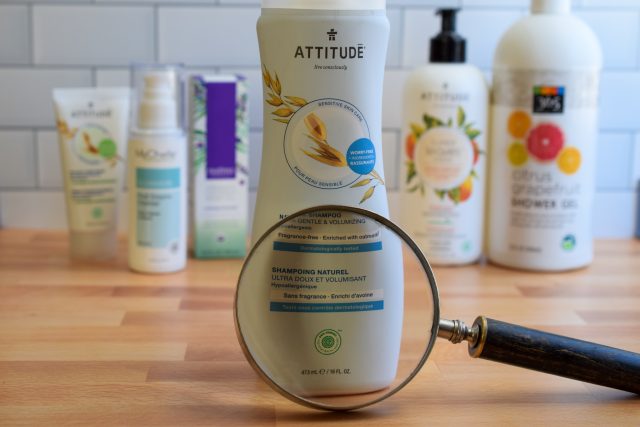
Step 2: Look for Certifications
There are quite a few certifications and seals of approval that can be helpful in finding the products with the attributes that matter most to you – whether it’s product safety, natural ingredients, certified organic, or something else.
When you see one of these third party certifications on a product, you know it has met a stringent set of requirements. Keep in mind that not all safer products use these certifications due to the expense and time it takes to earn them – so some of your smaller, indie beauty brands might not have any certifications.
Top Certifications for Non-Toxic Beauty Products
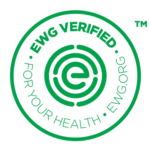
EWG Verified
- Set of standards that demonstrate EWG’s strict criteria for safety.
- Products must score “green” (1 or 2) in Skin Deep database.
- All ingredients must be disclosed, including all fragrance components.
- Learn more
- Example: MyChelle
- Find more of my favorite EWG Verified personal care products here
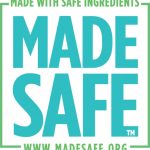
MADE SAFE
- Products are screened for against a toxicant database for known harmful chemicals such as carcinogens, endocrine disruptors, heavy metals and more.
- Supply chain and other contamination risks are considered.
- Ingredients are examined for bioaccumulation, persistence, and general and aquatic toxicity.
- Goes beyond individual ingredients to certify finished product.
- Learn more
- Example: Annmarie Skincare
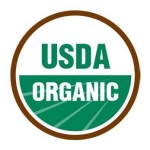
USDA Organic
- Products must contain at least 95% organic ingredients
- Standard created for food products (USDA has no authority over the production and labeling of cosmetics and personal care products)
- Certifying agent’s name and address must appear on the label
- Example: Coco Kind
- Learn more

Cosmos Standard
- A collaborative effort by several leading European certification organizations dedicated to organic and natural cosmetics.
- Includes Cosmos Organic and Cosmos Natural
- Example: Pai Skincare
- Learn more

NSF/ANSI 305
- Standard developed for personal care and cosmetics using organic ingredients
- Formula must contain at least 70% organic content by weight
- Example: Badger sunscreen & skincare
- Learn more
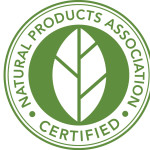
Natural Products Association
- Standard created specifically for personal care product
- Minimum 95% ingredients of natural origin
- No ingredients with any suspected human health risks
- No processes that significantly or adversely alter the natural ingredients
- Example: Burt’s Bees
- Learn more
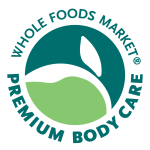
Whole Foods Market Premium Body Care
- Stringent guidelines for ingredient safety, environmental impact, source and efficacy
- Over 400 unacceptable ingredients including parabens, polypropylene glycol, sulfates, artificial fragrances and many more
- Used for both private label and independent brands sold at Whole Foods Market
- Example: Earth Mama
- Learn more
Get my list of Safer Swaps when you sign up for my mailing list.
Cruelty Free & Fair Trade Certifications
Some brands do a better job than others at social measures like paying fair wages or animal protection. These certifications will help you identify things that matter to you.

Leaping Bunny
- Company audit required to ensure no animal testing
- Ingredient suppliers included
- Example: Juice Beauty
- Learn more

PETA Cruelty Free
- Company pledge required but no audit
- Bunny Free App available
- Example: Acure
- Learn more

Certified Vegan
- No animal ingredients or byproducts allowed
- Animal testing not allowed
- Example: Dr. Bronners
- Learn more

Fair Trade Certified
- Ingredients sourced in a way that benefits workers, farmers, consumers and the earth
- Example: EcoLips
- Learn more

Fair For Life
- Assures that human rights are safeguarded at any stage of production, workers enjoy good and fair working conditions and smallholder farmers receive a fair share.
- Example: Alaffia
- Learn more

Step 3: Check Product Ratings
 Skin Deep Database
Skin Deep Database
One of the most popular tools for identifying safer products is the Skin Deep Cosmetics Database from the Environmental Working Group (EWG). Skin Deep provides safety ratings on personal care products and ingredients with a hazard score of 1-10 based on the known and suspected hazards of ingredients.
You can search by specific product, product type, brand or ingredient. While the database is extensive, not every product is available. If a specific product is not listed, then look up the individual ingredients.
EWG’s Healthy Living App
The Healthy Living app from the Environmental Working Group combines the data from Skin Deep, along with the EWG’s cleaning products database and Food Scores data – to create a comprehensive healthy living app. For personal care and beauty products, browse through the Personal Care section on the app. You can also scan the bar code on a product, which can be very helpful when you are in a store.
Think Dirty
The Think Dirty app was a personal project of founder Lily Tse to help people find safer cosmetics and personal products and avoid cancer and other unwanted health problems. Products can be scanned but you have to upgrade to a paid account to get access to a lot of the information.
Yuka App
The Yuka app was created as an independent project with a mission to help consumers make better choices for their health. The app is completely ad-free and the scores and recommendations are obtained independently, with no influence from outside brands or manufacturers. Products can be scanned directly from the app.
Be sure to check out my Non-Toxic Product Guides for lots of non-toxic brands and product ideas!
Your turn: How do you make decisions when shopping for beauty and personal care products?




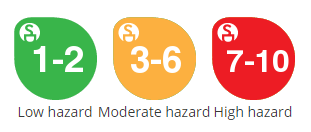 Skin Deep Database
Skin Deep Database
Wish I could have attended that discussion! I mostly use SkinDeep database. With “green” products entering the mainstream and “natural” products on the stores of many regular stores, this information is more important than ever!
Such awesome information. I would love to republish on my site as a guest blog from you. Let me know what you think about that! I loved being on the panel with you at ShiftCon, deciphering these certifications is hard. Even for those of us who are in the industry!
So glad we were on the panel together Lindsay! Loved that we all talked about a different piece of the puzzle. Sure – shoot me an email about doing a guest post on your blog – it sounds like a great idea!
I absolutely loved our ShiftCon panel. It’s so important to share information and make sense out of such a confusing topic that impacts almost everyone in some way. Thank you for helping us identify safer products and understand beauty product labeling. Now we need more regulations in place so products are tested and proven safe before they end up on our shelves! We have some work to do.
Yes, there’s more work to do – that’s for sure!
Great information! I love finding new natural personal care and beauty items. Once you know what to look for it can be fun. I love makeup but I feel I can get just as good, if not better, natural products.
I wish I could have gone to this panel! I think this is very important. The skincare brand I use does not have those certifications, but I spoke with the owner and have researched the ingredient and feel confident they are nontoxic. Furthermore, I like what they are doing for my skin, and on my tight budget, this option works for me. I’ve tried affordable organics that do not do anything for my skin and wonderful organic products that are outside my price range. I think we need to make the choices that work for us, while doing the research too! Thanks for sharing this.
Absolutely Gina! Luckily there is something for everyone out there! A lot of smaller producers won’t ever be able to afford certifications even though they are making very clean, safe products.
I haven’t seen the National Products Association label before so I will have to keep my eye out for that one.
I am 58 years old and looking for a good age-reversing/wrinkle or pore reducer that is natural. I have made the switch with my other beauty products, but am having a hard time finding anything local that fits the bill. Previously I used a L’Oreal product that worked great and allowed me to go without makeup, but was filled with un-pronounceable ingredients that I would like to avoid. Do you have any suggestions????
Hi Linda – I would recommend you take a look at the Stem Cellular Anti-Wrinkle Skincare line from Juice Beauty. I have used many of their products and love how they work on my skin! The moisturizer and the serum are my two favorite products in the line.
Thank you for all this information! I have such a hard time sifting through natural products while finding something that works well for me. Do you have a recommendation for shampoo or deodorant? I haven’t found one that I love yet!
Hi Whitney – I just wrote a post about natural deodorants! https://mindfulmomma.com/natural-deodorant-that-works/ and I’m working on a post about non-toxic shampoos. Some of the brands I like are Acure, Beautycounter, Mineral Fusion and Aubrey Organics. It’s hard cause everyone has different needs but you’ll find the right one eventually!
I’m learning this morning! 🙂 Thanks for the info.
Oh good – hope it helps!
Such helpful info! I will definitely be checking into the Skin Deep database! I have been using the app Think Dirty lately and find it helpful as well!
Yes, Think Dirty is helpful as well but the level of info you can get from Skin Deep is even greater!
Hello! Great Article! Thank you for taking the time to make it! Have you ever heard of Rejuva Minerals? Most of their products are EWG Verified and Made Safe Certified. I found them a couple years ago and absolutely love their makeup!
I’ve heard of Rejuva Minerals but have not tried them yet. LOVE that they are MADESAFE certified!!
I make my own.I don’t buy already made products of any kind.